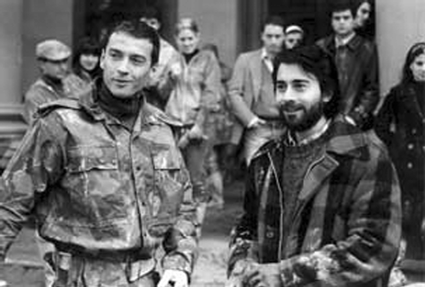By Leonard Quart
Two-part film on Italian brothers evokes complex family feelings
Marco Tulio Giordana’s “The Best of Youth” is a welcome new Italian film in the tradition of richly-textured, family epics like Visconti’s “Rocco and His Brothers.” It’s accessible and warm, and skillfully intersects its family drama with brief glimpses of almost four decades of contemporary Italian history. It also gives us, without turning into a tourist guide, a glance at a range of striking Italian locations—from the cities of Turin, Rome and Florence, to the volcanic island of Stromboli in the South and the Tuscan countryside in the North.
The film, shown in two parts, will wrap you into six hours of an incident-filled novelistic work—centering on the lives of two psychologically complex Roman brothers. They are fascinating in different ways: the sullen, tormented, alienated Matteo (Alessio Boni)—and the much sweeter, and more expressive and empathetic Nicola (Luigi Lo Cascio). Both are cultivated and sensitive men. The handsome Matteo is like a coiled spring—an abrupt, angry man who rejects his family, romantic relationships, and the world that is his birthright by joining the army and then becoming a policeman, looking for some semblance of internal order. While Matteo has the capacity to care for people, when given the opportunity, he always emotionally distances himself or flees.
Nicola, in turn, is an idealistic and passionate psychiatrist, who loves women, his friends and his daughter. He’s a man of feeling who, though living through a number of severe emotional traumas, remains capable of good humor and frivolity and deeply committed to his work, to other people, and to existence itself.
The two brothers’ lives intersect with major events in Italian history—Florence and the Uffizi during the flood, the struggle against the Mafia in Sicily, the 70s workers’ strikes and student activism in Turin, and the terrorism of the Red Brigades in the 80s. However, the larger social canvas is basically background for the human drama at the film’s center.
The film’s strength lies in its gift for evoking the complex feelings that exist in families, and between men and women. From the film’s inception when both brothers get involved with the same woman— an abused mental patient, Giorgia (Jasmine Trinca)—their characters are established. Matteo, who loves her is incapable of dealing with Giorgia’s pathology and disappears. While the gentler Nicola is able to quiet her and when he becomes a psychiatrist, help her readjust to the outside world.
None of Nicola’s compassion and goodness, however, can help him resolve the break-up of his own common-law marriage. Like Matteo, Nicola’s wired, moral absolutist partner Giulia (Sonia Bergamasco) abandons commitments—her music, her loving husband and even her four-year-old child, to become a terrorist. Her behavior is never fully explained, but images of an almost robotic Giulia carrying a gun, talking to Nicola through a glass prison partition, and trying to get a glimpse of her daughter without being seen, make her a riveting figure. She is a woman who carries within her so much despair about the ordinary world, that she must repudiate everything that connects her to it.
The film is critical of the corruption and inequity of Italian society, but is repelled by Giulia and her ideological comrades’ political jargon and commitment to violence. It clearly prefers Nicola’s dedication to individual freedom and his willingness to work through institutions to bring about incremental change. No grand, murderous gestures just daily good works.
“The Best of Youth” is however, much more interested in exploring the emotional lives of its characters than their social ideas or ideological allegiances. It has its flaws—too many fortuitous encounters, too lush and intrusive a soundtrack, some characters who are superficially sketched, and a conclusion that is a touch too neat and sentimental. But this is a stirring film dominated by indelible characters, including Matteo and Nicola’s cultivated schoolteacher mother, Adriana (Adriana Asti) who loves both her students and her children with enormous care and understanding. The film is emotionally expansive and wise. It is able to make an audience believe that while the world may be a vale of tears, a great deal of humanness and love also runs through it. The Best of Youth is an exemplar of a humanist film.





























